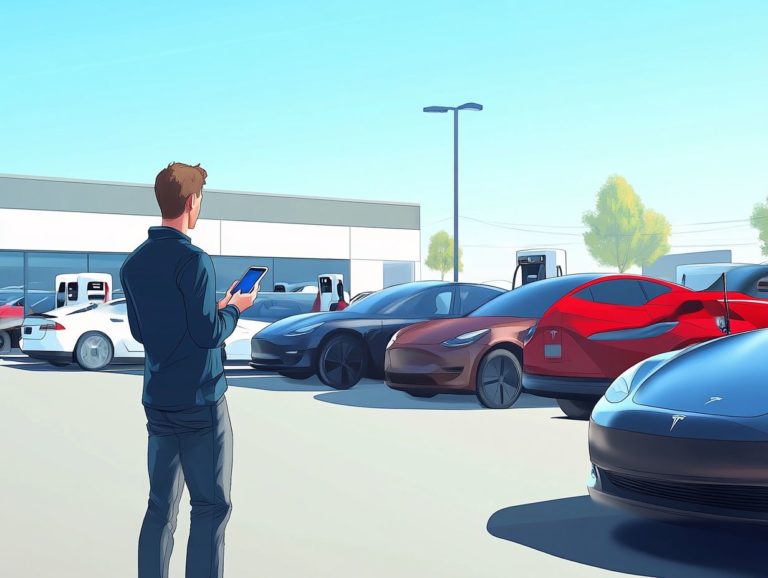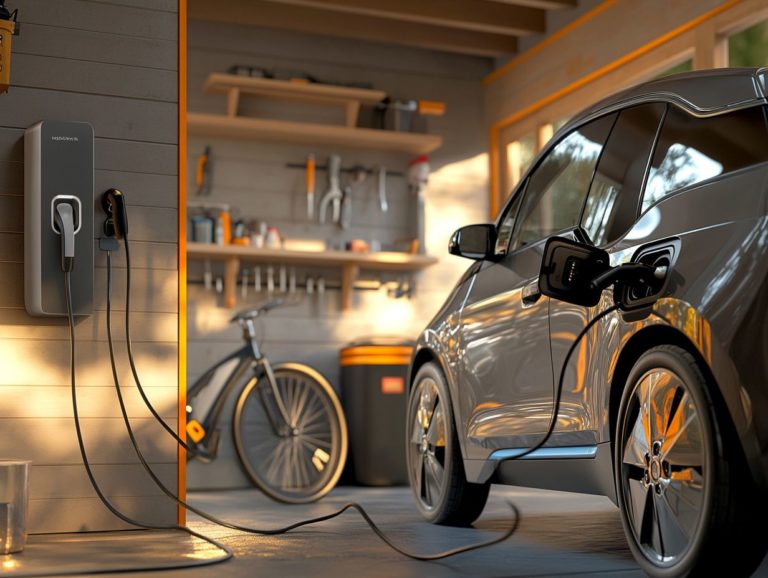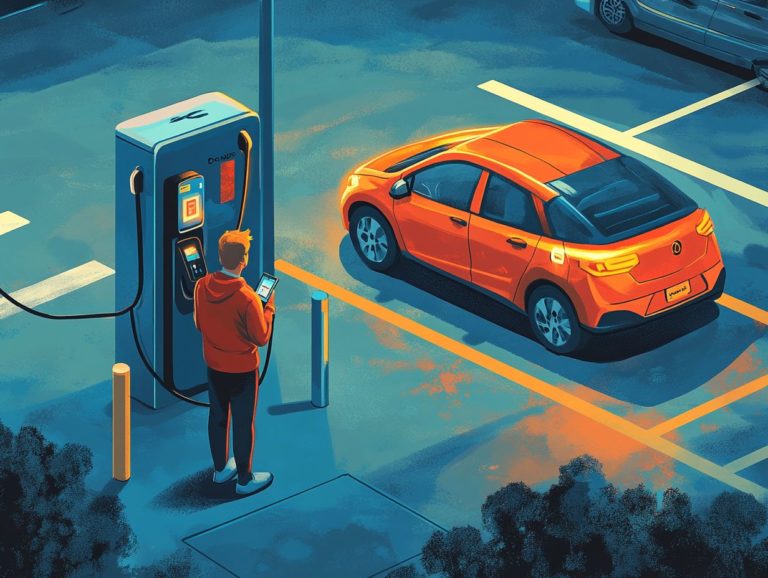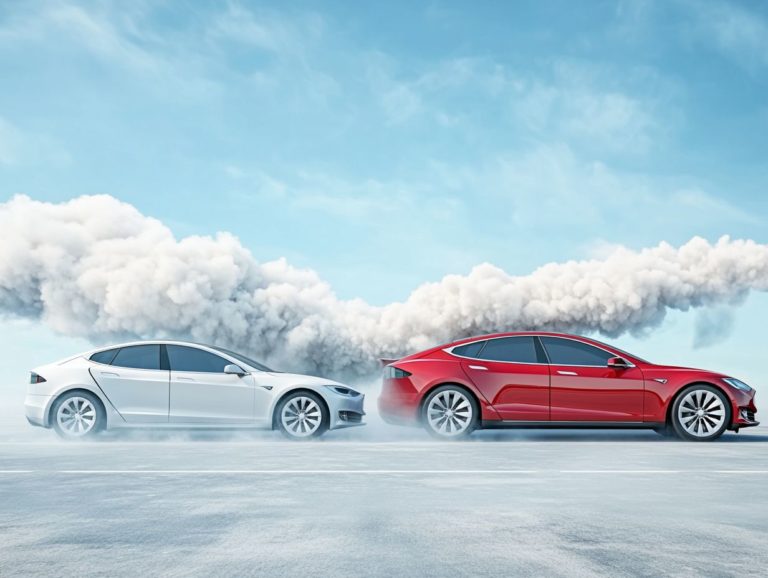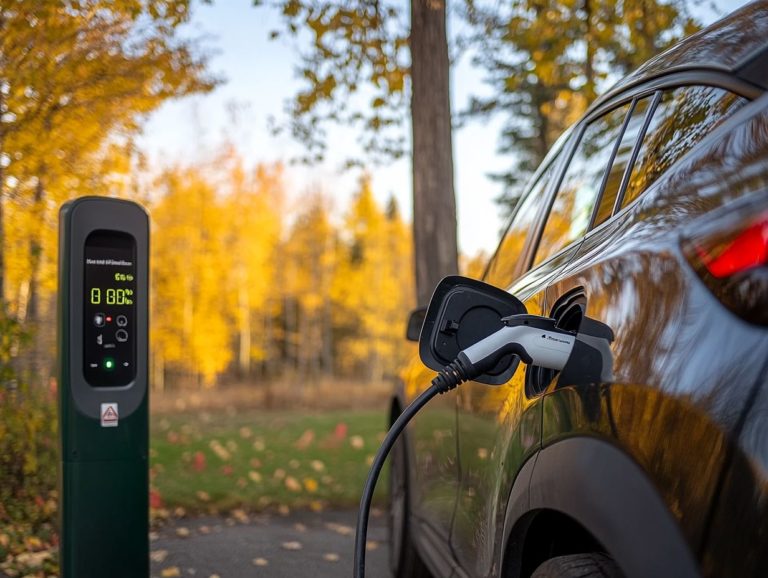What Are EV Incentives for Businesses?
Electric vehicles (EVs) are revolutionizing your perspective on transportation, offering benefits that extend well beyond personal use.
When you consider investing in EVs for your business, you open the door to substantial cost savings, a smaller environmental footprint, and access to government incentives.
This article delves into what EVs are and how they operate. It also explores the various financial advantages available to businesses like yours. You’ll learn about the types of incentives that can make the shift to electric not only feasible but also enticing.
You’ll also learn how to navigate the application processes and gain insights into what the future may hold for EV incentives. Understanding these opportunities can change your business for the better!
Contents
- Key Takeaways:
- Understanding Electric Vehicles (EVs)
- Benefits of EVs for Businesses
- Types of EV Incentives for Businesses
- How to Take Advantage of EV Incentives
- Future of EV Incentives
- Frequently Asked Questions
- What are EV incentives?
- What types of EV incentives are available for businesses?
- Who is eligible for these EV incentives?
- What are the benefits of taking advantage of EV incentives for businesses?
- Are there any restrictions or limitations for using EV incentives for businesses?
- How can businesses find out about available EV incentives?
Key Takeaways:

- EVs can significantly benefit businesses through cost savings and reduced environmental impact.
- Government incentives, such as tax credits and exemptions, can further enhance the advantages of switching to EVs for businesses.
- Businesses can take advantage of EV incentives by understanding the requirements and application processes and staying informed about potential changes and updates in the future.
Understanding Electric Vehicles (EVs)
Grasping the intricacies of electric vehicles (EVs) is crucial for anyone interested in sustainable transportation solutions. EVs operate on electricity, often leveraging cutting-edge technologies such as lithium-ion batteries or hydrogen fuel cells for optimal efficiency.
They offer a remarkable reduction in greenhouse gas emissions when compared to traditional fossil fuel vehicles. This positions them as vital players in the global transition toward clean energy. As urban areas enhance their public charging infrastructure and local utilities respond to the increasing demand for EV charging, the allure of electric vehicles captivates both consumers and businesses.
What are EVs and how do they work?
Electric vehicles (EVs) operate using sophisticated electric machinery powered by onboard batteries that store the energy driving the vehicle’s electric motor. These batteries, often of the lithium-ion variety, are pivotal in determining both the vehicle’s performance and its range.
You ll find that components like regenerative braking systems play a transformative role by capturing energy during deceleration and channeling it back into the battery. This enhances both longevity and efficiency.
The seamless collaboration between the battery management system (BMS) and the electric motor ensures optimal energy distribution, making your acceleration smooth and the driving experience enjoyable.
This harmonious synergy not only meets the energy demands of your vehicle but also contributes to reduced carbon emissions, perfectly aligning with the growing movement towards sustainable transportation solutions.
Benefits of EVs for Businesses
Electric vehicles (EVs) offer a wealth of advantages for your business. These benefits include substantial cost savings, a diminished environmental footprint, and access to government incentives. This makes them a compelling choice for commercial use.
With reduced operational costs and the possibility of tax credits, embracing clean vehicles can profoundly elevate your company s sustainability strategy.
Cost Savings and Environmental Impact
Transitioning to electric cars can unlock substantial cost savings for your business, primarily through reduced fuel expenses and lower maintenance costs. These savings are crucial, especially if you’re aiming to optimize your operational budget.
By embracing electric vehicles (EVs), you not only enjoy decreased fuel spending but also mitigate wear and tear, leading to lower maintenance expenses over time. These eco-friendly vehicles make a positive impact on the environment by significantly cutting down greenhouse gas emissions.
As more organizations adopt EVs, the collective reduction in carbon footprints becomes even more pronounced, contributing to a cleaner atmosphere that supports global sustainability goals.
This transition also enhances your financial efficiency while positioning your business as a responsible steward of the planet.
Government Incentives and Tax Credits

Government incentives and tax credits are pivotal in encouraging the adoption of electric vehicles. They present substantial financial advantages for businesses.
These incentives can significantly lower the upfront costs associated with purchasing EVs. This makes them far more accessible for both individuals and companies alike. The IRS offers valuable insights into available tax credits through recent legislation, including the Inflation Reduction Act. This act has introduced a range of appealing rebates. These programs spark interest in greener alternatives and support broader environmental goals.
Knowing the details of these incentives helps you save money and cut down on carbon emissions.
Types of EV Incentives for Businesses
Businesses aiming to embrace electric vehicles have the opportunity to leverage an array of enticing EV incentives. For instance, understanding tax incentives for EV buyers can provide generous rebates, valuable tax credits, and exemptions specifically designed for commercial use. This enhances the financial appeal of transitioning to electric mobility.
Rebates and Grants
Rebates and grants represent crucial financial incentives you can leverage when investing in charging stations for electric vehicles and commercial clean vehicles.
These funding opportunities are designed to reduce the upfront costs tied to acquiring and installing EV charging stations or transitioning to zero-emission vehicles. To qualify for these programs, you typically need to show a commitment to sustainability and meet certain eligibility criteria, which might include vehicle type, location, and ongoing compliance with local regulations.
The application process usually requires you to submit detailed project plans, proofs of purchase, and, in some cases, adhere to environmental standards. By exploring the available rebates and grants, you can significantly offset your investment costs, making the journey toward greener transportation solutions much smoother.
Tax Credits and Exemptions
Tax credits and exemptions can offer you substantial savings on both the purchase price and operational costs of electric vehicles. This allows you to effectively reduce your tax liability.
By leveraging these federal tax credits, you can lower your income before deductions, potentially unlocking further tax benefits. There are several credits available, including the Electric Vehicle Tax Credit, specifically designed to encourage the adoption of cleaner technologies.
To benefit from these credits, meet the eligibility criteria related to vehicle battery capacity and your income.
When it comes time to apply, you might need to complete forms like Form 8936. This requires detailed information about the purchase and usage of eligible vehicles, ensuring that you maximize the benefits available to you.
How to Take Advantage of EV Incentives
To fully capitalize on the advantages of EV incentives, understand the application processes and requirements tied to vehicle purchases and tax deductions.
Requirements and Application Processes

Understanding the requirements and application processes for EV incentives is vital for you to secure funding for the commercial installation of electric vehicles.
These initiatives typically come with specific prerequisites, such as showing a genuine commitment to sustainability and adhering to local regulations. You’ll need to gather essential documents, including IRS Form 8834 for the business credit, along with relevant state-specific forms that detail the type and number of vehicles you intend to purchase.
It’s important for you to be well-versed in IRS guidance concerning eligibility criteria and potential funding limits to avoid any pesky delays. With thorough preparation, you can facilitate smoother application reviews and significantly enhance your chances of receiving financial support. This makes it much easier for your organization to partake in the green movement.
Don’t miss out on these fantastic savings! Start your application process now to secure funding and join the green movement!
Future of EV Incentives
EV incentives are looking promising! The federal government and the Department of Energy are exploring innovative initiatives and potential changes to support your journey toward electric vehicle adoption across the U.S.
This changing situation offers exciting new chances that could enhance your experience as an EV owner.
Projected Changes and Updates
Changes to EV incentives will reflect new federal laws and responses from local utilities as they address the increasing demand for electric vehicles.
As state governments and local utility companies adjust, you’ll find tailored incentive programs to meet your specific needs. These changes will shape your adoption of electric vehicles and influence the strategies of businesses looking to invest in sustainable practices.
With federal incentives potentially leading the way, local utilities have a unique opportunity to innovate. They can ensure that infrastructure accommodates growing energy demands while offering attractive rate structures.
This emerging landscape will create a ripple effect, impacting both your cost of ownership as a consumer and the operational dynamics for businesses striving to enhance their environmental credentials.
Frequently Asked Questions
What are EV incentives?
EV incentives are government programs designed to encourage businesses to adopt electric vehicles through financial or tax benefits that offset the higher costs of EVs compared to traditional vehicles.
What types of EV incentives are available for businesses?

Common types include tax credits, grants, rebates, and discounts on charging equipment. Some cities or states also offer preferential parking or access to restricted lanes for EVs.
Who is eligible for these EV incentives?
Eligibility varies by program. Generally, businesses that own or lease vehicles for business purposes can apply, but criteria such as fleet size or vehicle type may apply.
What are the benefits of taking advantage of EV incentives for businesses?
By utilizing EV incentives, businesses can lower operational costs and reduce their carbon footprint. This also fosters a sustainable image, attractive to consumers and potential employees.
Are there any restrictions or limitations for using EV incentives for businesses?
Yes, there may be restrictions on the type and number of vehicles covered by incentives. Some incentives have deadlines or funding limitations, so it s crucial for businesses to research and apply in a timely manner.
How can businesses find out about available EV incentives?
Businesses can research available incentives through local government websites and organizations like the Department of Energy’s Alternative Fuels Data Center. Consulting a financial advisor or tax professional for personalized guidance is also recommended.
Explore available EV incentives now to benefit from them!


